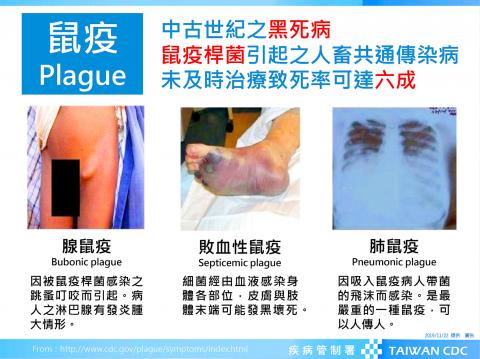A rumor about finding fleas or insect eggs with plague-causing bacteria on products purchased online from China is false, the Centers for Disease Control said yesterday.
The centers said on Friday that China confirmed a fourth case of the plague. A person living in Inner Mongolia ate raw wild rabbit and was infected with bubonic plague, one of three types of the plague.
The first case was confirmed in September after a person living in Gansu Province died of septicemic plague, followed by two cases of pneumonic plague contracted by a married couple in Inner Mongolia on Nov. 12, the CDC said.

Photo provided by the Centers for Disease Control
The centers said the Beijing Municipal Health Commission does not consider the fourth case to be associated with the second and third cases.
In response to the rumor that fleas or insect eggs with plague bacterium might be brought into Taiwan from clothes purchased online from China, the CDC yesterday said that the plague cannot be transmitted in this way.
CDC Deputy Director-General Philip Lo (羅一鈞) said that when a flea bites an infected rat or mouse, the plague-causing bacteria Yersinia pestis enters the digestive tract of the flea and forms a biofilm in the foregut, causing the flea’s digestive tract to be blocked.
The infected flea starves because of the blocked digestive tract and starts biting animals, transmitting the bacteria to new hosts, he said, adding that therefore, infected fleas would not be found on clothes or packaging materials.
Lo said that cargo ships or aircraft have a higher chance of transmitting the plague if live rodents or other vectors are on board. In response, the CDC has enhanced quarantine measures at harbors and airports.
To lower the risk of infection, the CDC urged people not to approach rodents, eat raw meat or touch dead animals when visiting Inner Mongolia or areas where the plague might be spreading.
The centers also asked people to report to the centers’ airport quarantine stations and seek medical assistance if they feel any discomfort after returning to Taiwan.
Additional reporting by CNA

Chinese spouse and influencer Guan Guan’s (關關) residency permit has been revoked for repeatedly posting pro-China videos that threaten national security, the National Immigration Agency confirmed today. Guan Guan has said many controversial statements in her videos posted to Douyin (抖音), including “the red flag will soon be painted all over Taiwan” and “Taiwan is an inseparable part of China,” and expressing hope for expedited reunification. The agency last year received multiple reports alleging that Guan Guan had advocated for armed reunification. After verifying the reports, the agency last month issued a notice requiring her to appear and explain her actions. Guan

GIVE AND TAKE: Blood demand continues to rise each year, while fewer young donors are available due to the nation’s falling birthrate, a doctor said Blood donors can redeem points earned from donations to obtain limited edition Formosan black bear travel mugs, the Kaohsiung Blood Center said yesterday, as it announced a goal of stocking 20,000 units of blood prior to the Lunar New Year. The last month of the lunar year is National Blood Donation Month, when local centers seek to stockpile blood for use during the Lunar New Year holiday. The blood demand in southern Taiwan — including Tainan and Kaohsiung, as well as Chiayi, Pingtung, Penghu and Taitung counties — is about 2,000 units per day, the center said. The donation campaign aims to boost

The Kaohsiung Tourism Bureau audited six hotels in an effort to prevent price gouging ahead of Korean band BTS’ concert tour in the city scheduled for Nov. 19, 21 and 22 this year. The bureau on Friday said that the audits — conducted in response to allegations of unfair pricing posted on social media — found no wrongdoing. These establishments included the local branches of Chateau de Chine, Hotel Nikko, My Humble House, and Grand Hai Lai, it said, adding that the Consumer Protection Commission would have penalized price gougers had the accusations been substantiated. The bureau said the Tourism Development Act

The military yesterday said it has located the flight data recorder, or black box, of an F-16V jet that disappeared off eastern Taiwan earlier this month, and it would soon deploy a salvage team to try to retrieve it. Air Force Command Headquarters said that while it had pinned down the location of the black box, it was still searching for the aircraft’s sole pilot, air force Captain Hsin Po-yi (辛柏毅). Without providing details, the air force said it had located the black box days after detecting some intermittent signals and would now engage a team of professionals to retrieve it. The air